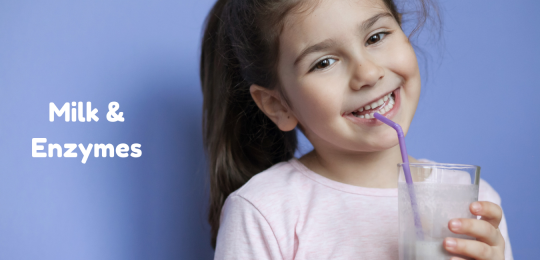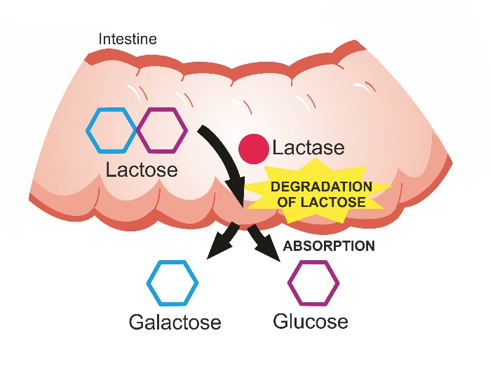
Blog BY Staff | 2 September 2019
Milk and Enzymes

Enzymes are found everywhere. They play many roles in helping us be able to function and even the decaying process of life in all forms. Milk enzymes can come from the natural state of milk, bacterial contamination or enzymes that are added for fermentation. Majority of the natural enzymes found in milk do not play a role in the digestion of humans, generally added enzymes take on this role, along with enzymes found in the human gastrointestinal tract.
What are enzymes?
Enzymes are biological molecules or proteins that speed up the chemical reaction within cells. They each serve important functions in the body and are vital to life. Enzymes are defined by their specificity, chemical nature and sensitivity, they function within a certain pH and temperature. They are essential for digestion, respiration, muscle and nerve function and many other roles.
There are 100’s of enzymes in milk and they offer a special role in what function they do. Milk enzymes are there as antibacterial factors, by-products, to form minerals and nutrients and purely for the animal. Just like humans, cows and animals will have their own enzymes that play a similar role in the break down of foods and process in the functions of organs.
What enzymes do we have that break down milk in the body?
As mention enzymes are needed to create chemical reactions which break down particles into smaller and smaller molecules which allow the human body to absorb and use what is left over. With milk our bodies use an enzyme named lactase which is made in the small intestine and breaks down the lactose found in milk. Lactase will break down the lactose which is a form of sugar into glucose and galactose. We then use these sugars as energy and fuel our bodies to function.

Why are added enzymes important in milk and milk products?
After milk has been collected, sometimes further enzymes are added to the process, so we are able to digest and absorb the nutrients provided by milk or alter its form. Some enzymes include proteases, which hydrolyses the casein proteins and helps form cheese. Another is lactase, which is added to help people with lactose intolerance and remove the pressure on the system to break it down. Catalase and lipases are added to milk to help form different types of cheeses and flavours. Added enzymes are used to allow us to have a variety in diary products but also to help anyone that may suffer from a food intolerance.
Enzymes play an amazing role in the human body but also many other things. They allow us to eat our food and the functioning of DNA. Enzymes in milk go hand in hand in not only allowing us to digest and absorb the nutrients but also the shelf life and texture.
